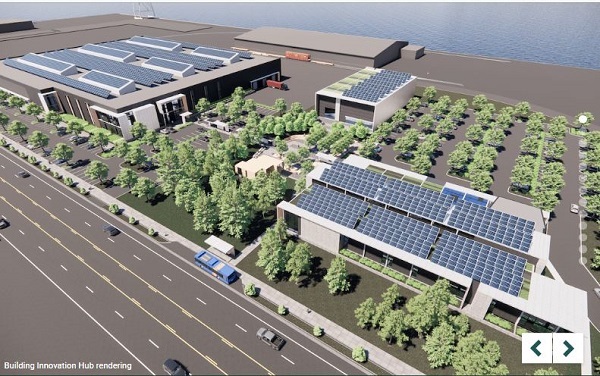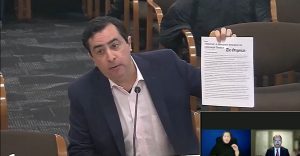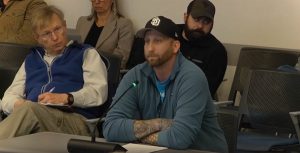Mass timber coalition wins $41.4 million to boost Oregon forest products industry
7 min read
Sept. 2, 2022 – The Oregon Mass Timber Coalition, led by the Port of Portland, will receive $41.4 million to modernize and boost the forest products industry in Oregon, using mass timber to accelerate affordable housing production, provide good jobs, and restore forest health.
“I am thrilled that the Biden Administration recognizes the critical nature of supporting an evolving timber industry here in Oregon,” said Rep. Peter DeFazio (OR-04). “Utilizing modern forestry products such as mass timber will not only help address our nationwide housing shortage, it also creates jobs and ensures long-term forest health and resiliency.”
Research and development projects by the University of Oregon and Oregon State University will lead the design and prototyping of new construction materials and products, and public testing facilities will certify that developed products meet fire and acoustic codes, paving the way for production and sale.
Infrastructure improvements at the Port of Portland will create a site suitable for private investment in a Mass Timber Campus which will manufacture housing at scale, and the Oregon Department of Land Conservation and Development will ensure planning and development codes are primed to accommodate modular mass timber homes in rural and wildlife-impacted communities.
Funding will also support a workforce development project that partners with industry, workforce boards, and labor organizations to provide training in industries related to these new wood-based products.
“Oregon sits at a crossroads in 2022,” states the project synopsis. “Its rural economies never fully recovered from the 1980s decline of the timber industry, and since then the rural-urban divides – cultural, economic, political – have widened. Climate change has given rise to extreme droughts, record-breaking heat waves, unhealthy forests, lower waterways, negative impacts to natural areas, and – in 2020 – devastating wildfires. The wildfires and straight line winds triggered disaster declarations in 20 of Oregon’s 36 counties, caused an estimated $1.15 billion in damage and response costs, and destroyed 4,300 homes, exacerbating a pre-existing housing shortage.”
“In this moment of change in Oregon, the Oregon Mass Timber Coalition (OMTC) has come together to equitably build rural and urban economies while piloting alternative methods for housing construction through strategic investment into the mass timber cluster. Using mass timber to accelerate housing production, while putting people to work in good jobs and restoring forest health is a quintessentially Oregon innovation.”
The synopsis lists ten component projects:
- Mass Timber Factory. Construct a factory for manufacture of modular homes and building components using innovative mass timber technology, automation, and trained skilled workers.
- Workforce Training Center. Construct a training facility serving not just the adjacent factory, but the region’s broader needs for upskilling workers for advanced manufacturing and 21st-century construction.
- Regional Training Cluster – Workforce Development and Training Strategy. Link rural and urban communities by focusing on jobs in forestry, construction, and advanced manufacturing.
- Advancing a Forest Restoration Supply Chain. Address environmental considerations and clear the way to permit a sizeable forest restoration project within the Willamette National Forest.
- Oregon Fire Testing Facility (OFTF). Construct, equip, and commission an intermediate-scale fire testing facility at Oregon State University’s Corvallis campus.
- Mass Timber Modular Housing Systems – Prototyping & Testing. Assess the technical performance of modular building designs developed by Coalition partners.
- Smart Forestry Solutions: Paving the Way from Forest Restoration to Mass Timber. Improve the economic and technical feasibility of utilizing low-value wood species for mass timber products.
- Oregon Acoustic Research Laboratory (OARL). Construct a state-of-the-art facility for conducting acoustics tests of mass timber assemblies to support the expansion of the mass timber industry.
- Mass Timber Prefabricated Panels for Affordable Housing Prototype Development. Test design assumptions through the development of built prototypes for Affordable Housing.
- Code-UP – Community Development Code Update Project. Modernize development codes in ten Oregon communities impacted by housing shortages exacerbated by 2020 wildfires and create a model for other communities to permit mass timber modular housing.
“This federal investment shows how Oregon continues leading the way in modernizing wood products, generating jobs and economic opportunities in communities statewide,” said Oregon Sen. Ron Wyden. “I’m gratified that the Oregon Mass Timber Coalition has earned these resources from the American Rescue Plan for fresh approaches to our state’s signature timber industry. And I’ll keep fighting for similar investments in Oregon to support these valuable new sources for jobs and building materials.”
“Mass timber is an exciting innovation with huge untapped potential. Accelerating affordable housing production, providing good jobs, sequestering carbon, and restoring forest health will provide immense benefits for Oregonians as we seek to construct more energy efficient buildings for the future using all tools available to us,” said Oregon Sen. Jeff Merkley. “I’m glad to see the federal government step up to support this quintessential Oregon project, bringing together a broad group of partners to address multiple challenges at once with an innovative solution that will support jobs in our woods, our timber mills, and our cities alike.”
“Congratulations to the Oregon Mass Timber Coalition on winning a $41.4 million grant through the Build Back Better Regional Challenge,” said Rep. Suzanne Bonamici (OR-01). “The Coalition, an innovative partnership between government agencies and educational institutions, has worked tirelessly to advance mass timber production and to craft a plan to build affordable housing with mass timber. With this grant, the Coalition will contribute to better forest management, address the housing crisis, fight climate change, and create good jobs in rural as well as urban communities. It has been a pleasure to support the Oregon Mass Timber Coalition through this process, and I look forward to seeing all they will accomplish with this federal grant.”
“The Oregon Mass Timber Coalition is poised to play a critical role in solving our affordable housing crisis,” said Rep. Earl Blumenauer (OR-03). “It’s also the key to a low carbon sustainable future based on Oregon’s forest products industry. I’m pleased the Biden Administration recognizes this. It is an exciting development, and I’m looking forward to tracking the progress with the Port of Portland, Hacienda Community Development Corporation, and many others.”
The Oregon Mass Timber Coalition is one of 21 winners – each a regional coalition of partnering entities – that will receive awards between $25 million and $65 million to implement an average of six integrative projects that will enable each region’s economic transformation and competitiveness.
“The Biden Administration is committed to supporting communities as they create pathways for sustainable economic development. For many rural communities in Oregon, timber is a vital industry key to jobs, housing, and the environment,” said U.S. Secretary of Commerce Gina Raimondo. “This investment will create new economic opportunities across Oregon to help it not only recover from the economic impact of the coronavirus pandemic but build back stronger and more equitably.”
“Sustainable economic development is among EDA’s key investment priorities,” said Assistant Secretary of Commerce for Economic Development Alejandra Y. Castillo. “Today’s investment in the Oregon Mass Timber Coalition will help bolster business, create jobs, and improve quality of life in rural communities across Oregon.”
The Build Back Better Regional Challenge (BBBRC) is an unprecedented competitive federal grant program that provides each regional coalition with significant investments to tackle a wide variety of projects – including entrepreneurial support, workforce development, infrastructure, and innovation – to drive inclusive economic growth. Each coalition’s collection of projects aims to develop and strengthen regional industry clusters – all while embracing economic equity, creating good-paying jobs, and enhancing U.S. competitiveness globally. Projects span 24 states and include $87 million to two primarily Tribal coalitions and over $150 million for projects serving communities impacted by the declining use of coal.
The 21 BBBRC awardees were chosen from 60 EDA-designated finalists that each received approximately $500,000 in funding and technical assistance to continue developing their cluster strategies. The funding for each coalition is approximate, with awards to be signed later in September. Those 60 finalists were chosen from a Phase 1 applicant pool of 529 applications, which exemplifies the tremendous demand for transformational economic development approaches. EDA will continue to support all 60 finalists with the creation of a Community of Practice that will provide technical support, foster connectedness with peer regions and build capacity.
The Build Back Better Regional Challenge is one of EDA’s many programs aimed at building strong regional economies and supporting community-led economic development. EDA was allocated $3 billion in supplemental funding under the American Rescue Plan to assist communities nationwide in their efforts to build back better by accelerating economic recovery from the coronavirus pandemic and building local economies that will be resilient to future economic shocks. As a part of this funding, EDA allocated $300 million through a Coal Communities Commitment to support coal communities in pandemic recovery and help them create new jobs and opportunities, including through the creation or expansion of a new industry sector. Specifically, EDA has dedicated $100 million of its Build Back Better Regional Challenge funds and $200 million of its Economic Adjustment Assistance funds to directly support coal communities. Grantees for EDA’s full suite of American Rescue Plan programs will be awarded on a rolling basis through September 30, 2022. For more information, visit https://www.eda.gov/ARPA/.
About the U.S. Economic Development Administration (www.eda.gov)
The mission of the U.S. Economic Development Administration (EDA) is to lead the federal economic development agenda by promoting competitiveness and preparing the nation’s regions for growth and success in the worldwide economy. An agency within the U.S. Department of Commerce, EDA invests in communities and supports regional collaboration in order to create jobs for U.S. workers, promote American innovation, and accelerate long-term sustainable economic growth.







